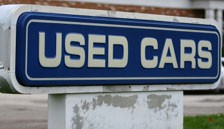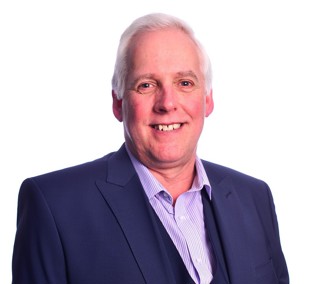Last year, with sales starting to stutter, it made an operating profit of £134,000.
Why the big turnaround? Group revenues rose from £157m to £195m over the two-year period, but the real impact came with a business restructure that saw the company dispose of loss-making dealerships and enter sale-leaseback agreements on other sites.
Chris Elvidge, brought in as managing director by chairman and owner Anthony Wickins to implement the changes, says it has taken 18 months to put City Motor Holdings back on an even keel. “The business had several issues including some accountancy problems, which resulted in a large write off. I was brought in for three months but that turned into a full-time position,” he says.
Elvidge also took on the finance director’s role after the previous incumbent left the business. He sold five unprofitable sites last year – Suzuki Bognor Regis, Mitsubishi, ChryslerJeep and MG Rover in Chichester and a bodyshop in Chichester – and closed a second bodyshop in Newbury (“the bodyshop business should be left to the specialists,” he says).
“We had to decide whether we were a property company or a motor business,” Elvidge adds. “That saw us sell a lot of dealership property to Deutsche Bank, which we are leasing back on a 25-year agreement.”
#AM_ART_SPLIT# Performance had also been compromised by the level of investment and acquisition activity involved when City Motor Holdings won the Mercedes-Benz West Country market area during the network shake-up in 2002. The group had to buy out four retailers, and spent much of the subsequent three years operating out of temporary facilities. Building work on the final showroom in Truro will be complete by the second quarter next year.
Add to this the cost of building a five-franchise Autoplaza in Basingstoke and the acquisition of a bodyshop and Ford showroom from Gowrings, and it’s no surprise when Elvidge says CMH “lost control a bit”.
Crucial improvements have been made in F&I performance, where earnings have tripled, and used cars, up 40%, within the past couple of years. An important factor in the success of the used car business has been CMH’s four Part Exchange centres. They take off-profile cars from the group priced in the £2,000-5,000 range and typically older than three years.
“The philosophy was to not let the trade make money out of cars that we didn’t want to sell from the franchised dealership,” says Elvidge.
He believes the group can further improve its new and used car sales, and stresses the need to squeeze more from the business. “We have finished with the disposals and the restructuring. Now we have to sweat the assets and get more out of our sites, with twinning franchises a possibility. The focus is on profits.”
#AM_ART_SPLIT# He expects 2006 to be the year when CMH starts making “proper returns”, with Mercedes coming on strong. That part of the business, already making money, is predicted to account for a third of turnover and up to 75% of profits, as new car margins improve and add to income from used cars and aftersales. CMH is budgeting group profits at £1.5m-2m on turnover of £190m next year.
“The motor industry has slim margins compared to other industries. The perception is that we make thousands of pounds on cars, but the reality is that we sell at a loss or for little money in order to make volume bonuses,” says Elvidge.
Chairman Anthony Wickins agrees: “1% return on sales for all the work we do isn’t much, in fact it’s laughable compared to other industries, but we are hearing that the manufacturers are recognizing this,” he says. “Mercedes and others are mindful that we have to make returns to stay in business and provide the customer service that we, and they, want.”
Wickins, whose uncle started British Car Auctions back in 1946, says the majority of growth over the next couple of years will be organic. He is looking to add one or two more sites to the 15-dealership group, with Vauxhall and Honda favoured to give multiple representation with all partners.
CMH has just dropped MG Rover at its five-acre Autoplaza in favour of Kia. This retail park, which opened in 2003 and also has Ford, Peugeot, Citroën, Honda outlets and a petrol forecourt, is the jewel in the business. Elvidge wants it to become “the destination of choice for anyone looking for a car within a 40-minute drive”.
One issue affecting the marketing, however, is the fact that each franchise trades under a different name, including Gowrings Ford, Viking Citroën and City Honda. CMH is reviewing the situation and is likely to adopt one of the existing names across the five dealerships. “We will probably do the same in our other regions, depending on which name we feel is strongest in that area,” adds Elvidge. The exception is the Mercedes business, which trades under the manufacturer’s brand.
#AM_ART_SPLIT# Elvidge predicts greater opportunities for some retailers after October when the Location Clause is scrapped but believes the extent of any shake up depends on the big groups.
“Dealers could open smaller facilities with lower standards and no contracts. They could swap franchises easily until they find one that works,” he says. “But it all depends on the big players.
The ones that have lots of representation with one franchise could take the power away from the carmaker – but will they be brave enough?”
His route in the motor industry was unconventional. A chartered accountant by trade with PricewaterhouseCoopers, (“the advantage of having an accountancy background is that I don’t get duff explanations on the numbers”) he became finance director at Ilkeston Co-op, overseeing various interests including one dealership. He took responsibility for growing the motor division, expanding it from one site in 1989 to 31 in 2002.
Elvidge left with the intention of setting up his own dealership but the uncertainty concerning the block exemption changes meant it was hard to secure funding. That’s when CMH called.
And with the support of his chairman “rolling up my sleeves and getting involved”, the business is now on a more secure footing.
“Bearing in mind the last few years, I am happy with the way the group is performing,” says Wickins. “We have the right brands and the right partnerships and we are well placed to handle future changes in the market.”

Year-on-year turnover for City Motor Holdings since 1999 (Source: AM100)
#AM_ART_SPLIT# Analyst’s View
City Motor Holdings’ financial performance is improving, but it faces two key challenges, according to one industry analyst who asked not to be named.
“A major issue is making the huge Mercedes territory work. CMH paid £3.5m just to buy the business and it is spending more on building new showrooms,” he says.
“The other big challenge is the structure. Does the group concentrate on geography or scale relationships? It’s got a bit of both, but needs more scale with chosen partners if the group is to focus on its existing geographic areas of Basingstoke, Chichester and Horsham. This means infilling using a Vardy-style strategy of piecemeal acquisitions to get economies and back office synergies.
“This is a resilient company. It’s been messed around by manufacturers and it’s faced tribulations of accounting black holes and come through both. It now needs to be resilient to work through structural change.”
#AM_ART_SPLIT# Eric Hayward – 60 years
Is Eric Hayward the longest serving automotive retail employee? Not only is he celebrating 60 years in the industry, he’s also celebrating 60 years with the Ford franchise.
The name of the business might have changed several times, but Hayward has remained a loyal employee at the same dealership.
Hayward, who started at Pass & Co on VJ Day, August 14, 1945, puts his longevity down to the industry’s relentless pace of change, which “keeps my brain active”.
“It’s not like bricklaying or carpentry where it’s always the same thing,” he says. “The motor trade is changing all the time. When I started, engines only lasted 30,000 miles or so, then they had to be reconditioned. Now they last for hundreds of thousands of miles.”
Hayward believes today’s industry could learn a thing or two from the past. “There were no receptions in those days – every member of staff had contact with the customers,” he says. “We had to repair everything because there weren’t parts departments, so starter motors were cleaned out and reconditioned, for example. We only had a few spanners and screwdrivers, whereas now the technicians have thousands of pounds-worth of tools in their boxes.”
But some things have improved. “The facilities are much better today for the employees and the showrooms are really impressive.”
And the wage is slightly better – Hayward started on a weekly income of 87p. Now warranty administrator at City Motor Holdings’ Gowrings Ford outlet in Newbury, he has no intention of retiring. “The time has really flown by. I never intended to work so long – it just sort of happened,” he adds.
So, does Hayward hold the UK record? If you are, or know, someone that has spent even longer in the automotive industry please let AM know. Email: stephen.briers@emap.com

















Login to comment
Comments
No comments have been made yet.